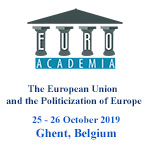Euroacademia Conferences
 Europe Inside-Out: Europe and Europeanness Exposed to Plural Observers (9th Edition) April 24 - 25, 2020
Europe Inside-Out: Europe and Europeanness Exposed to Plural Observers (9th Edition) April 24 - 25, 2020 Identities and Identifications: Politicized Uses of Collective Identities (9th Edition) June 12 - 13, 2020
Identities and Identifications: Politicized Uses of Collective Identities (9th Edition) June 12 - 13, 2020 8th Forum of Critical Studies: Asking Big Questions Again January 24 - 25, 2020
8th Forum of Critical Studies: Asking Big Questions Again January 24 - 25, 2020 Re-Inventing Eastern Europe (7th Edition) December 13 - 14, 2019
Re-Inventing Eastern Europe (7th Edition) December 13 - 14, 2019 The European Union and the Politicization of Europe (8th Edition) October 25 - 26, 2019
The European Union and the Politicization of Europe (8th Edition) October 25 - 26, 2019 Identities and Identifications: Politicized Uses of Collective Identities (8th Edition) June 28 - 29, 2019
Identities and Identifications: Politicized Uses of Collective Identities (8th Edition) June 28 - 29, 2019 The European Union and the Politicization of Europe (7th Edition) January 25 - 26, 2019
The European Union and the Politicization of Europe (7th Edition) January 25 - 26, 2019 7th Forum of Critical Studies: Asking Big Questions Again November 23 - 24, 2018
7th Forum of Critical Studies: Asking Big Questions Again November 23 - 24, 2018 Europe Inside-Out: Europe and Europeanness Exposed to Plural Observers (8th Edition) September 28 - 30, 2018
Europe Inside-Out: Europe and Europeanness Exposed to Plural Observers (8th Edition) September 28 - 30, 2018 Identities and Identifications: Politicized Uses of Collective Identities (7th Edition) June 14 - 15, 2018
Identities and Identifications: Politicized Uses of Collective Identities (7th Edition) June 14 - 15, 2018
Does Fake News Affect Voting Behaviour?
-
-

-
Presentation speakers
- Michele Cantarella, Fondazione Marco Biagi, University of Modena and Reggio Emilia / European Central Bank
- Nicolò Fraccaroli, University of Rome Tor Vergata, Italy
- Roberto Volpe, Italian Ministry of Economic Development (MISE), Italy
Abstract:
Over the last decade, the erosion of trust in public institutions and traditional media sources have been proceeding in parallel. Recent developments in media consumption have led to a proliferation of politically charged online misinformation. In this paper we investigate whether the spread of fake news has affected the results of recent elections, contributing to the growth of populist party platforms. We aim to quantify the causal effect of the spread of misinformation over electoral outcomes in the 2018 Italian General elections. The presence of Italian and German linguistic groups in the Trento and Bolzano/Bozen autonomous provinces offers a unique source of exogenous variation, as it assigns individuals into distinct filter bubbles each differently exposed to misinformation. We introduce a novel index based on text mining techniques to measure populism. We construct a novel database with social media content of each party and their leaders over the course of the electoral campaign for the 2013 and 2018 elections. Our results indicate that misinformation had a negligible and non-significant effect on populist vote in Trentino and South Tyrol during the Italian 2018 general elections
-
Related Presentations

#Portichiusi: The Human Costs of Migrant Deterrence in the Mediterranean
- Michele Cantarella

Synchronicity: Contemporary Europe as a Temporal Project
- Emi Finkelstein













